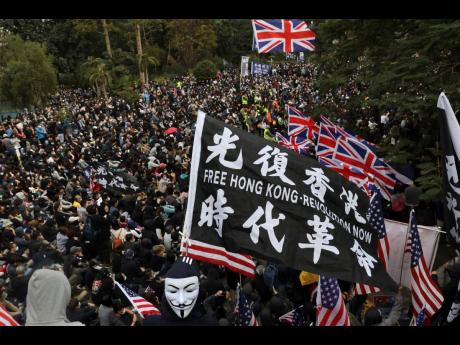UK-China ties freeze with debate over Huawei, Hong Kong
LONDON (AP):
Only five years ago, then British Prime Minister David Cameron was celebrating a “golden era” in UK-China relations, bonding with President Xi Jinping over a pint of beer at the pub and signing off on trade deals worth billions.
Those friendly scenes now seem like a distant memory.
Hostile rhetoric has ratcheted up in recent days over Beijing’s new national security law for Hong Kong. Britain’s decision to offer refuge to millions in the former colony was met with a stern telling-off by China. And Chinese officials have threatened “consequences” if Britain treats it as a “hostile country” and decides to cut Chinese technology giant Huawei out of its critical telecoms infrastructure amid growing unease over security risks.
All that is pointing to a much tougher stance against China, with a growing number in Prime Minister Boris Johnson’s Conservative Party taking a long, hard look at Britain’s Chinese ties. Many are saying Britain has been far too complacent and naive in thinking it could reap economic benefits from the relationship without political consequences.
“It’s not about wanting to cut ties with China. It’s that China is itself becoming a very unreliable and rather dangerous partner,” said lawmaker and former Conservative leader Iain Duncan Smith. He cited Beijing’s “trashing” of the Sino-British Joint Declaration – the treaty supposed to guarantee Hong Kong a high degree of autonomy when it reverted from British to Chinese rule – and aggressive posturing in the South China Sea as areas of concern.
“This is not a country that is in any way managing itself to be a good and decent partner in anything at the moment. That’s why we need to review our relationship with them,” he added. “Those who think this is a case of separating trade from government … you can’t do that, that’s naïve.”
Duncan Smith has lobbied other Tory lawmakers to cut Huawei out from Britain’s superfast 5G network. Not only that: He says all existing Huawei technology in the UK telecoms infrastructure also needs to be eliminated as soon as possible.
Centre of tensions
The company has been at the centre of tensions between China and Britain, as UK officials review how the latest US sanctions – imposed over allegations of cyberspying and aimed at cutting off Huawei’s access to advanced microchips made with American technology – will affect British telecoms networks.
Johnson decided in January that Huawei can be deployed in future 5G networks as long as its share of the market is limited, but officials have since hinted that that decision could be reversed in light of the US sanctions. A new policy is expected within weeks.
Huawei says it is merely caught in the middle of a US-China battle over trade and technology. It has consistently denied allegations it could carry out cyberespionage or electronic sabotage at the behest of the Chinese Communist Party.
“We’ve definitely been pushed into the geopolitical competition,” Vice-President Victor Zhang said Wednesday. US accusations about security risks are all politically motivated, he said.

